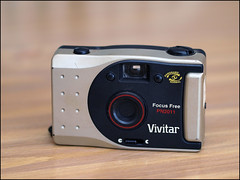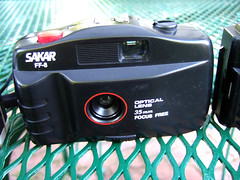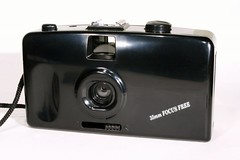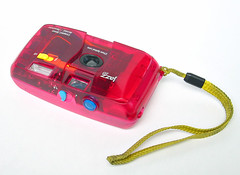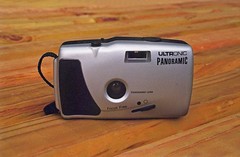Difference between revisions of "Trashcam"
(forgot one!) |
m |
||
| Line 9: | Line 9: | ||
|image_rights= with permission | |image_rights= with permission | ||
}} | }} | ||
| − | The term '''trashcam''' has sometimes jokingly been applied to simple plastic cameras of extremely low value. These might include promotional giveaways, dollar-store closeouts, or thrift-shop finds—but also examples of outright deception such as the [["Olympia" camera]]. Trashcams may be branded using unfamiliar made-up names, familiar distributors like [[Vivitar]], or | + | The term '''trashcam''' has sometimes jokingly been applied to simple plastic cameras of extremely low value. These might include promotional giveaways, dollar-store closeouts, or thrift-shop finds—but also examples of outright deception such as the [["Olympia" camera]]. Trashcams may be branded using unfamiliar made-up names, familiar distributors like [[Vivitar]], or recycled defunct trademarks like [[Argus]], [[Ansco]], and [[Bell & Howell]]. |
In contrast to [[point-and-shoot]]s, trashcams are almost universally [[fixed focus]] and have no (or very limited) control over [[exposure]]. This may yield acceptable photo results at medium distances and typical outdoor illumination, but fails miserably outside those parameters. (A few may offer a pipsqueak flash for indoor photos—again, only giving correct exposure at one middling distance.) There is a continuum between cheap plastic cameras that actually have reasonable optics, such as the [[Ansco Pix Panorama]], and true [[toy cameras]] that are especially prized for their degraded, aberrated imagery. | In contrast to [[point-and-shoot]]s, trashcams are almost universally [[fixed focus]] and have no (or very limited) control over [[exposure]]. This may yield acceptable photo results at medium distances and typical outdoor illumination, but fails miserably outside those parameters. (A few may offer a pipsqueak flash for indoor photos—again, only giving correct exposure at one middling distance.) There is a continuum between cheap plastic cameras that actually have reasonable optics, such as the [[Ansco Pix Panorama]], and true [[toy cameras]] that are especially prized for their degraded, aberrated imagery. | ||
Latest revision as of 13:29, 31 May 2021
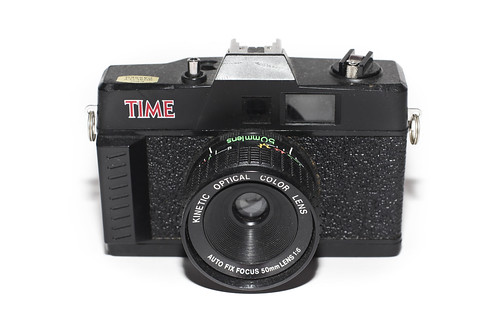
|
| The ubiquitous Time camera Faux-SLR styling at minimized cost image by Bracket ツ (Image rights) |
The term trashcam has sometimes jokingly been applied to simple plastic cameras of extremely low value. These might include promotional giveaways, dollar-store closeouts, or thrift-shop finds—but also examples of outright deception such as the "Olympia" camera. Trashcams may be branded using unfamiliar made-up names, familiar distributors like Vivitar, or recycled defunct trademarks like Argus, Ansco, and Bell & Howell.
In contrast to point-and-shoots, trashcams are almost universally fixed focus and have no (or very limited) control over exposure. This may yield acceptable photo results at medium distances and typical outdoor illumination, but fails miserably outside those parameters. (A few may offer a pipsqueak flash for indoor photos—again, only giving correct exposure at one middling distance.) There is a continuum between cheap plastic cameras that actually have reasonable optics, such as the Ansco Pix Panorama, and true toy cameras that are especially prized for their degraded, aberrated imagery.
While trashiness is naturally a subjective and debatable concept, one working definition of a trashcam might be, "any camera whose value at least doubles when loaded with film."
|
|
|
|
|
|
